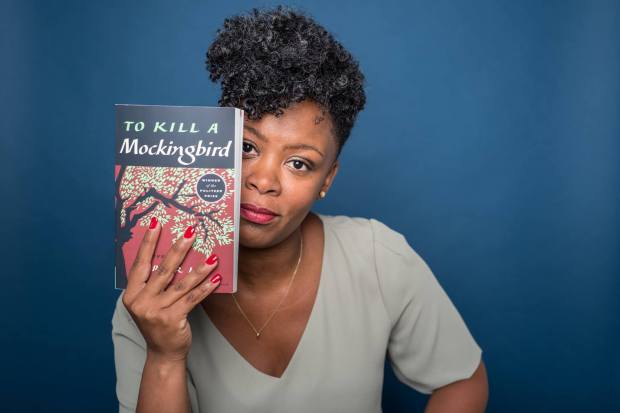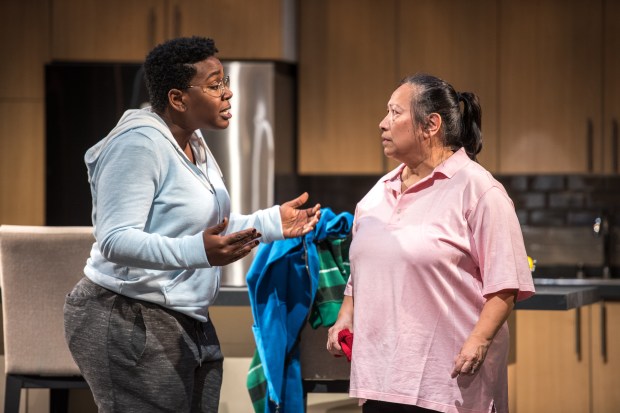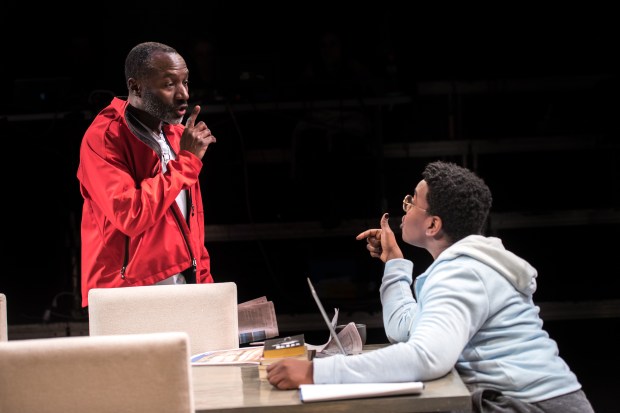“Race, Allyship & How the Past Informs the Present” In Conversation with Audrey Dwyer, playwright & director of CALPURNIA

Interview by Bailey Green.
I sat down with Audrey Dwyer, playwright and director of Calpurnia, to discuss race, allyship and how the past informs the present. Calpurnia, co-produced by Nightwood Theatre and Sulong Theatre, is a courageous and explosive play that takes place during a dinner party. Julie, a screenwriter, attempts to re-imagine Harper Lee’s novel To Kill a Mockingbird from the perspective of Calpurnia—the Finch’s maid.
Dwyer began writing Calpurnia in 2012, some time after Trayvon Martin was killed. Dwyer was playing a maid in a show, and a cast mate remarked on how strong Dwyer’s character was. The cast mate was referring to a moment in the show where Dwyer’s character was silent during a racist attack on her character. Dwyer noted how the character’s silence was put upon them and how for many women, silence and strength is not always a choice.
The conversation prompted Dwyer to look deeper into mammy culture, domestic workers and how Black women as maids serve a function in literature. She was in a writer’s unit, working on a piece that wasn’t connecting, when she had a conversation with a friend about how the past illuminates the present. Dwyer remembered reading To Kill a Mockingbird in high school: “It is such an iconic book, and I wondered is there a way for me to talk about mammy culture in the present, and hearken to the past, while examining a book that is Pulitzer Prize-winning and seen as the purest example of equality of how we should be in the world?”
(Interview has been edited for length and clarity.)

Photo of Audrey Dwyer
BG: Do you feel that your relationship to the book has changed over time or do you feel those core reactions are still as strong?
AD: When I read it back in high school, I was one of the only Black people in my class and I remember feeling really isolated when conversations happened around the usage of the n word. That is one of the primary ways people analyze the book in schools, should we say the n word? And that conversation happening around me as the only Black person in my class felt shameful and embarrassing. It didn’t serve my needs and it didn’t help the racism I was experiencing while in school. Equality was another theme that was touched on and that conversation also felt awkward for me because I wasn’t being seen as an equal in that conversation. Years later when I approached the book I was flummoxed why this book was being taught in schools in this way […] The conversation about the book hasn’t changed. I think of things like how Tom Robinson was shot 17 times as he was running away from the cops… now you read that book and you’ve got young Black men in school, how is that narrative serving them? How is the narrative of a Black man seen as a violent sexual abuser, he’s innocent but he’s portrayed in that way, how does that help? In terms of rape culture you’ve got Mayella Ewell who is on the stand and she is being treated horribly by Atticus Finch. If I was a teenage girl watching that film reading the book and I had a situation I might have shared with a police officer or teacher or parent, this book tells me don’t do it.

Photo Credit: Dahlia Katz
BG: I was reading some Goodreads reviews last night for fun, specifically the one star reviews and I was surprised that people are still holding on to this incredibly problematic set of two-dimensional characters. One review said ‘this is a perfect example of a white guilt fantasy,’ would you agree with that statement?
AD: White saviour syndrome is definitely Atticus Finch. We can look at that lawyer and feel like he’s such a hero but when you dig through it, he was just doing his job. And you can look at what the time period was and Black men were being lynched left right and centre. Black men, Black boys, Black women, Black elderly people, the atrocities that Black people were going through were so abundant. So to have a book about a white man who was trying to save the day through the legal system definitely perpetuated that white men can save the day. I’m not entirely convinced, especially when you look at our laws, that the character of Atticus Finch actually promotes change. I think that he makes us feel good, or some of us feel good. He talks to Scout and explains to her that the men who want to lynch Tom Robinson are men who simply have a blind spot. But we can look at what happened in Charlottesville, those men with torches… can we say that they had a blind spot or can we say that they were an organized group of educated men who had a mission? Can we say that some of the alt right groups here in Toronto, do they have a blind spot or [are they] well-intentioned in their minds? And the way we teach young white people about racism, we can’t say someone had a blind spot. We have to crack that open and talk about systemic violence, power, how to stand up for marginalized people in the moment. And not just about Black people, all people. There are too many people who don’t feel like they have a voice, too many groups that don’t have a voice. And I think that To Kill a Mockingbird describing violence as ‘folks aren’t seeing straight’ is harmful.

Photo Credit: Dahlia Katz
BG: Absolutely, and how Atticus speaks to Scout about race reflects a culture with white children being told that everyone is the same, that you don’t see race. […] Do you show that kind of relationship in the play, with Atticus and Scout, or do you diverge from that?
AD: A lot of the characters in the play are inspired by TKAM and how they speak to each other, allyship is a huge theme. We have examples of when allyship works out and we have examples when it doesn’t work out and I definitely wanted to show all of it. In some cases, some people don’t even want allyship. I’m trying to address what it looks like when you want to help and you fail, when you want to help and you think you succeed, and when you’re helping but your help isn’t necessary. It’s so complicated. This time in our lives is full of people wanting to know how to be better, but I think the key is obviously empathy but also listening. Checking yourself and just listening, spending more time hearing where people are coming from. If you feel the anxiety that you’ve done something wrong, listen to that, why do you feel so guilty if someone is telling you a hurt or an injury they have? You will see elements of Atticus and elements of the innocence of Scout but who it comes from is also very interesting too.

Photo Credit: Dahlia Katz
BG: I love the trailer, and in it you mention how allyship is a hot topic and people think they know exactly what it means.
AD: Allyship is an everyday practice. Another danger in TKAM is that [it says] racism looks like X. Ignorance looks like X. And the thing is what one person finds harmful and painful, another person may not. People end up feeling like well, I’m a good person and what hurt? You didn’t hurt my friend so what is your problem? Listening and understanding that there is not one single definition.
BG: We’re at a dinner party, who are the guests? Where do we find the characters?
AD: We’ve got Julie, a screenwriter. We’ve got Thompson who is a lawyer and has his own law firm and we’ve got Mark who is Julie’s brother and Christine who is Mark’s girlfriend. Christine is also Julie’s best friend, although they are not as close as they used to be. And Lawrence is Julie and Mark’s father. And Precy is their Filipina maid.

Photo Credit: Dahlia Katz
BG: What did you find the most challenging in the adaptation or in the process? What challenged you the most as a writer with this piece?
AD: I think the thing that was the most challenging and at the same time the most rewarding was each character, getting into the mindset, and making them be as warm as I possibly could make them but also as flawed. When I say warm I mean everybody thinks that their intentions are good. Making characters that are authentic and recognizable […] The book, to me, has a number of stereotypes. I wanted to take those and have them be recognizable in the play without being so pointed. I play with stereotypes but they are not exactly what you expect.
BG: How was the shift from writer to director?
AD: Really good. I was quite firm with myself as a playwright/director. It’s very easy to want to make cuts but I’ve had a lot of opportunity via Obsidian Theatre and Nightwood Theatre to workshop it so I felt quite ready. One of the things that I did was make a conscious choice to work on the dialogue with the woman who is playing Precy, because I am not a Filipina woman and I wanted to make sure that I was checking my privilege as a writer. Over the drafts that I have written, I have given drafts to other theatre artists, dear old friends, and every time I have “gotten this character right” is a sign that I am probably making a mistake, and now in the rehearsal hall, it is great that I am working alongside the actor that I have chosen so that she can tell me directly, ‘I wouldn’t say that here.’ It’s a lot of fun to put it up on its feet. It’s an honour to have this opportunity and the actors are awesome.

Photo Credit: Dahlia Katz
BG: You’re partnering with the AMY project. Can you tell me a bit more about that?
AD: So we’re looking for some donations to help us throughout the run, and I’ve been a mentor with the AMY project for a few years over their long, long history, and I really love the AMY project. I love what they are providing to the community, I love that they’re trying to give voice to young women and non-binary youth. They give young artists the opportunity to create pieces with mentors. They are an under-served group of people who really need it.
BG: Any shows you’d like to shout out that are coming up?
AD: The Rhubarb Festival, everyone should go and see Rhubarb shows.
BG: Lastly, did you have any advice from someone you loved or a colleague that helped awaken something in the play?
AD: Kelly Thornton gave me a quote, but it’s about writing the thing that makes you the most uncomfortable and in writing Calpurnia I felt very, very uncomfortable and that if you feel uncomfortable, that your audience will also feel that and that discomfort can offer some insight from time to time:
“When starting a play, I ask myself, “What’s the last play in the world I would ever want to write?” Then I force myself to write it. I do this because I’ve found that the best way to make theatre that unsettles and challenges my audience is to do things that make me uncomfortable. I work with stories that I find trite and embarrassing, I keep the development of the text as open and unstable as possible throughout the rehearsal and performance process, and I emphasize rather than hide problems in the text and production. I’m constantly trying to find value in unexpected places. My work is about struggling to achieve something in the face of failure and incompetence and not-knowing. The discomfort and awkwardness involved in watching this struggle reflects the truth of my experience.” – Young Jean Lee
Calpurnia

Who:
Written and Directed by Audrey Dwyer
A Nightwood Theatre and Sulong Theatre Co-Production
CAST –
Don Allison
Matthew Brown
Carolyn Fe
Natasha Greenblatt
Andrew Moodie
Meghan Swaby
CREATIVE TEAM cont-
Tsholo Khalema – Assistant Director
Anna Treusch – Set Design
Jackie Chau – Costume Design
Bonnie Beecher – Lighting Design
Johnny Salib – Sound Design
Christine Urquhart – Props Coordinator
Megan Cinel – Assistant Set Designer
Emma Welsh – Assistant Costume Designer
Christina Cicko – Stage Manager
Neha Ross – Assistant Stage Manager
Suzie Balogh – Production Manager
Adriana DeAngelis – Assistant Production Manager
What:
A classic novel turned on its head. A dinner party gone wrong.
A hilarious and provocative look at class, race and family dynamics under the roof of a wealthy Jamaican-Canadian home. As screenwriter Julie seeks to redress To Kill a Mockingbird through the perspective of Calpurnia – the Finch family maid – her tactics meet with explosive results at an important family dinner party. A brave, insightful, and outrageous new play.
Where:
Buddies in Bad Times Theatre
12 Alexander Street
When:
January 14 – February 4, 2018
Tickets:
nightwoodtheatre.net
Connect:
t: @nightwoodtheat
fb: /nightwoodtheatre
ig: @nightwoodtheat
#Calpurnia


